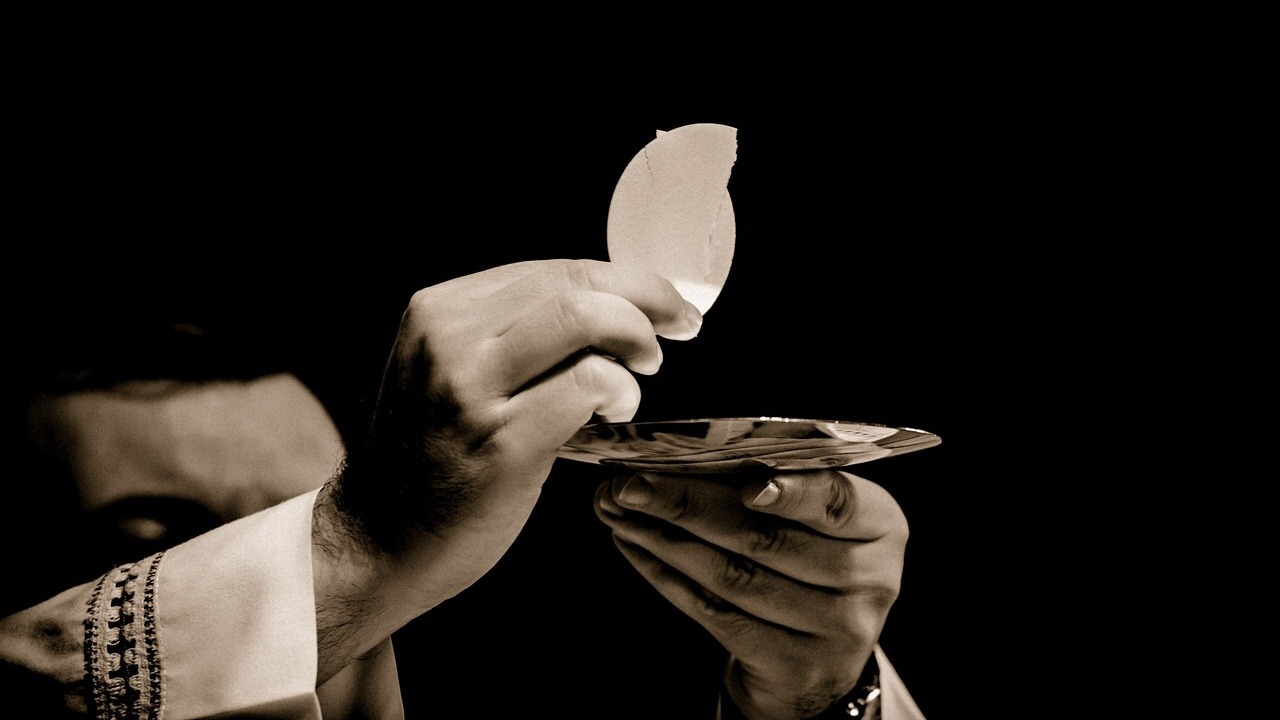
s it happens, I have already answered this objection before in a two-part exegesis of John 6. That was back in 2014. You can read them here and here. (You ought to, because I go into a lot of detail I won’t repeat below.) But recently an anti-Catholic stated the objection to transubstantiation in a peculiarly absolutist sort of way:
[Communion] is supposed to be done purely as a symbol or metaphor of the body and blood of Christ. However in Catholic mass before everyone participates in the communion, the priests conduct a ritual that they call transubstantiation. They believe this ritual/prayer turns the bread and wine into Christ’s literal body and blood which is not true and this is cannabilistic in nature.
It is supposed to be merely a symbol? Who says? Where can I find this spelled out any such way in the Bible? Is there a text where Christ says, “Now, do this as a symbol of my body and blood?” If the Bible does not spell this out for us in terms like that, then what we have here is an interpretation; and the anti-Catholic I cite above fails to show why it is necessary.
Indeed, in John 6, Christ consistently speaks of this as though he really is being literal:
Then Jesus said unto them, Verily, verily, I say unto you, Except ye eat the flesh of the Son of man, and drink his blood, ye have no life in you.
Whoso eateth my flesh, and drinketh my blood, hath eternal life; and I will raise him up at the last day.”
For my flesh is meat indeed, and my blood is drink indeed.
He that eateth my flesh, and drinketh my blood, dwelleth in me, and I in him.
As the living Father hath sent me, and I live by the Father: so he that eateth me, even he shall live by me.”
“My body is true food,” Christ says. “My blood is true drink,” he says. And at the Last Supper: “This is my body”; “this is my blood.” He does not say “This represents my body and blood.” He insists on literal terms.
A true believer that the Eucharist is merely a symbol of Christ’s body and blood must show why this is the necessary interpretation that follows from John 6 and from the Last Supper texts in all four gospels.
Why, when Christ’s audience in John 6 objects, “How can this man give us his flesh to eat?” does he not say, “Wait, I am just being symbolic”? Why instead does he repeat himself in the same literal terms he had just used? (If anything, Christ doubles down and becomes even more stark in his literalness. I explain this in my earlier articles.) Why is he willing to let so many abandon him upon a misunderstanding?
And, if the Eucharist is just a symbol, what are we to make of Paul’s words in 1 Corinthians 11:29? For those who eat and drink without discerning the body of Christ eat and drink judgment on themselves.
And how is it that the earliest Christians simply understood that the Eucharist does in fact become the body and blood of Christ?
Here is Justin Martyr in the First Apology 66:
For not as common bread and common drink do we receive these; but in like manner as Jesus Christ our Saviour, having been made flesh by the Word of God, had both flesh and blood for our salvation, so likewise have we been taught that the food which is blessed by the prayer of His word, and from which our blood and flesh by transmutation are nourished, is the flesh and blood of that Jesus who was made flesh.
And here is St. Cyril of Jerusalem in his Catechetical Lectures 19:7 and 22:2:
[T]he Bread and Wine of the Eucharist before the invocation of the Holy and Adorable Trinity were simple bread and wine, [but] after the invocation the Bread becomes the Body of Christ.
—
He once in Cana of Galilee, turned the water into wine, akin to blood, and is it incredible that He should have turned wine into blood?
And explanation for all this is necessary, not just a hit-and-run declaration that we are “supposed” to interpret communion as a symbol. Says who?
As for the charge of cannibalism, anyone who makes such a claim doesn’t quite understand the distinction between substance and accidents which the Church teaches. Substantively (in their essence) the Eucharistic elements become the body and blood of Christ. But the accidents (i.e., the taste, smell, appearance, etc.) remain bread and wine. That is to say, we are not eating Christ’s body or blood in the form of flesh, or the form of blood.
Tim Staples goes into much more detail on this, and I would recommend you read this article. He lays out several ways in which communion and cannibalism are different. Michael Foley notes some other differences:
- Cannibals eat the dead, but Christ is living;
- Cannibals eat the body, but Catholics also receive the soul and divinity of Christ;
- The body and blood, soul and divinity of Christ are infinite, not finite;
- The Eucharist is neither violent nor bloody, as in cannibalism
When people make claims like this, they are really being too clever by half, and haven’t fully thought it through. These two articles are good at explaining important differences between cannibalism and Eucharist.
The only necessary burden of proof is upon the anti-Catholic to show why a metaphorical reading of the texts is the necessary one. It’s not “necessary” just because someone shows up on Facebook and says it is.
Discover more from To Give a Defense
Subscribe to get the latest posts sent to your email.